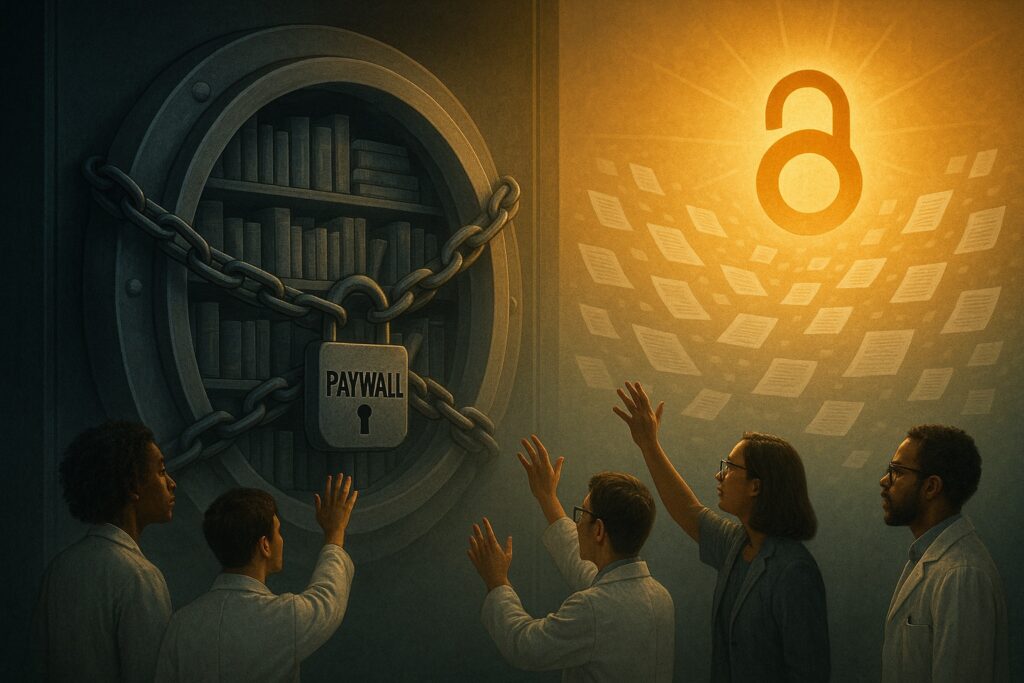
The Problem: Who Owns Knowledge?
In today’s world, scientific knowledge drives almost everything. It shapes public health decisions, vaccine development, climate policy, farming practices, and education. But there’s a key question that often gets ignored. Who really owns knowledge?
Is it something we all share, like clean air and safe water? Or is it treated like a product that’s owned, restricted, and sold to whoever can pay the most?
Paywalls in a Pandemic
This tension became clear in early 2020 when COVID-19 started spreading around the world. Scientists needed quick access to data from past outbreaks like SARS and MERS. But a lot of that research was stuck behind academic paywalls. One article could cost between 30 to 50 dollars, leaving researchers without university access unable to get the information they needed.
A Better Way: Open Access
At the same time, a different model surged: Open Access. Platforms like medRxiv, bioRxiv, and the COVID-19 Open Research Dataset (CORD-19) made research freely available. Knowledge was shared in real time across borders, helping speed up vaccine development, empower local clinics, and save lives.
The Publishing Industry’s Excuse
Traditional journals say paywalls are needed to keep quality high. They point to things like peer review, editing, and the technology that supports their work.
They argue that without money from subscriptions or article sales, maintaining academic standards would be difficult.
The Hidden Cost: Public Knowledge, Privately Owned
Peer review is important, but the business side tells a different story. Many top publishers, like Elsevier, make profit margins between 30 and 40 percent, matching some of the biggest tech companies.
Even more surprising, most research is paid for by the public. Scientists write, review, and edit the papers, usually without getting paid. Then the public has to pay again to access the research.
This creates a paradox: Knowledge created for the public good is turned into a private asset.
“The academic publishing system is built on unpaid labor and public funding—but sells access at premium prices.”
— Tennant et al., The Academic, Economic, and Societal Impacts of Open Access (2016)
During COVID-19, the open-access model proved that free, fast, high-quality publishing is possible. When knowledge is shared, humanity wins.
The Pungwenist View: Truth Belongs to Everyone
“If truth must be bought, it is no longer truth. It’s a business model.”
In Pungwenism, truth is a shared inheritance. When critical research is locked behind paywalls, it violates the principle that wisdom must flow freely.
- We value peer review, but not when it becomes a gatekeeping tool.
- We support open collaboration over closed profit loops.
- We believe access to truth should be a right, not a luxury.
Imagine a public fountain that makes you pay for cups. That’s what science behind paywalls feels like. It quietly teaches us to believe that access has to be earned or bought, even though it already belongs to everyone.
The Real Harm: Slower Progress, Greater Inequality
When knowledge is commodified:
- Progress slows
- Inequality grows
- Trust erodes
Open access isn’t about charity or favors. It’s about fairness. It means making sure scientific knowledge is available to everyone, not just those who can afford to pay for it.
To walk the path of truth means to keep the doors open, the channels flowing, and the wisdom shared.
Sources:
- Tennant, J. P. et al. (2016). “The academic, economic and societal impacts of Open Access: an evidence-based review.” F1000Research.
- Brainard, J. (2020). “Scientists are drowning in COVID-19 papers. Can new tools keep them afloat?” Science.